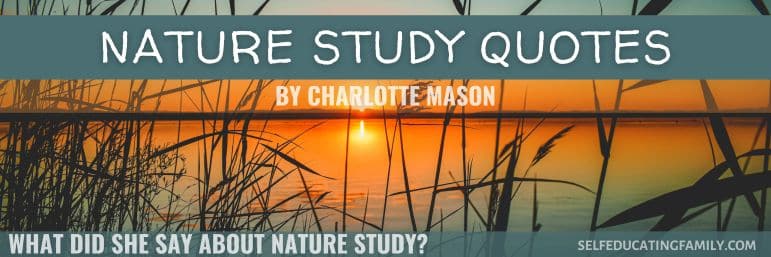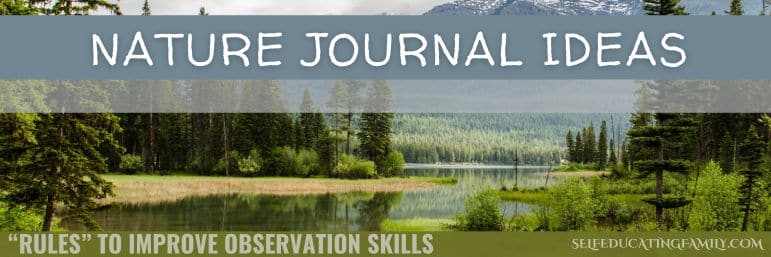What’s inside: Charlotte Mason Nature Quotes. What is the underlying philosophy of why nature study can be so beneficial for your children? Here are tips to be successful.
This post may contain affiliate links. If you find my content valuable and make a purchase through one of my links, I will earn a commission. At no cost to you, which helps me keep this blog going so I can help you even more! I recommend products I trust and/or use myself, and all opinions I express are my own. Read the full disclaimer here.
Charlotte Mason Nature Quotes
19th Century educator, Charlotte Mason wrote many insightful ideas about our relationship with nature. Look at her book, The Home Education Series: Volume 1, Home Education. In it, she dedicates part of the first volume to the “Out-of-Door Life for the Children”.
I’ve collected quotes from this section to help outline what she advocated about nature study.
Nature Study
Nature study was one of the primary tools of the youngest learning period for a child. And we should not neglect this subject as the child grows. A familiarity, like an old friend, would develop between the young child and nature because of spending much time together. This familiarity would form the basis for the growing relationship that took the child into maturity.
Charlotte Mason relied on this relationship when educating children.
Quotes
I’m categorizing the quotes that Charlotte Mason wrote to answer a few key questions about nature study. Unless noted, they are all from Volume 1, Home Education, Part II: Out-of-Door Life for the Children.
Why?
Why is nature study so vital to a balanced education? Charlotte Mason thought it was integral to the human condition – that people were meant to experience the natural world.
- “We were all meant to be naturalists, each in his degree, and it is inexcusable to live in a world so full of the marvels of plant and animal life and to care for none of these things.”
- “Consider, too, what an unequaled mental training the child-naturalist is getting for any study or calling under the sun––the powers of attention, of discrimination, of patient pursuit, growing with his growth, what will they not fit him for?”
- “Let them once get touch with Nature, and a habit is formed which will be a source of delight through life.”
- “The sense of beauty comes from early contact with Nature.”
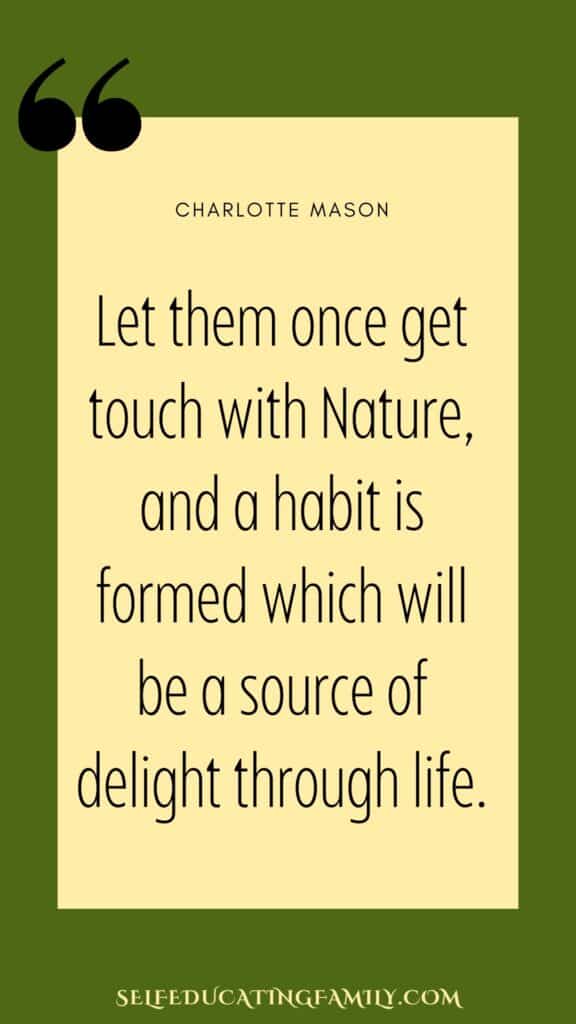
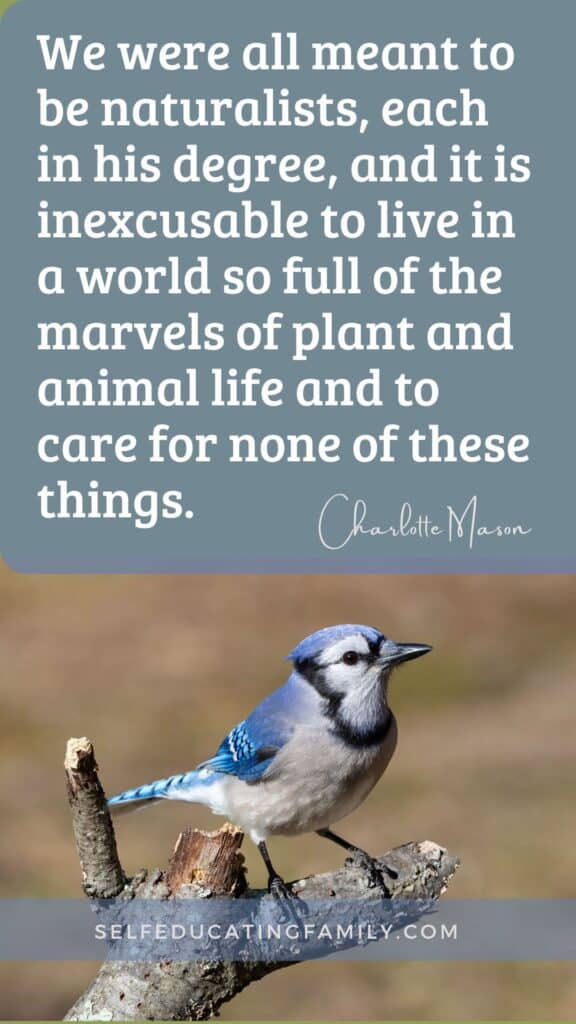
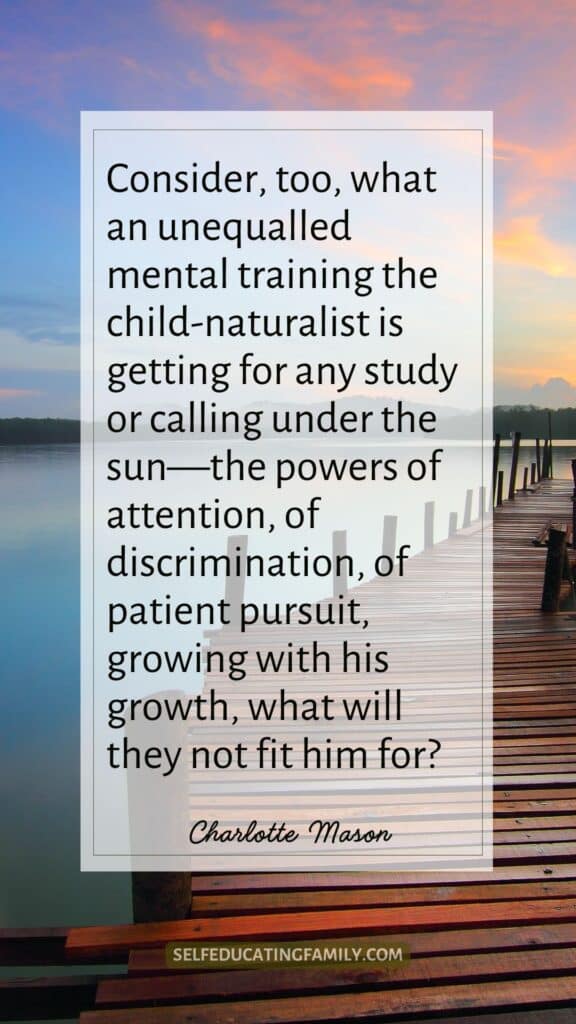
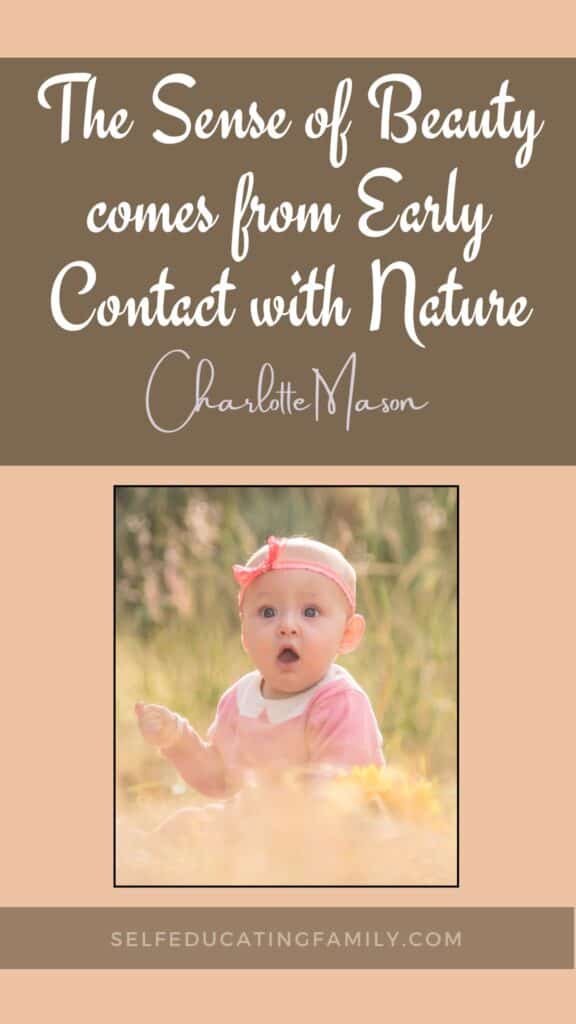
What other benefits from nature study?
Remember, the following quotes are from over a hundred years ago! The world had just experienced the Industrial Revolution and many people were moving to cities. Education was changing to producing “good workers” for society’s factories.
Charlotte Mason believed children needed the quiet time in nature to help develop the sense of curiosity.
- “For we are an overwrought generation, running to nerves as a cabbage runs to seed; and every hour spent in the open is a clear gain, tending to the increase of brain power and bodily vigour, and to the lengthening of life itself.”
- “For of the evils of modern education few are worse than this––that the perpetual cackle of his elders leaves the poor child not a moment of time, nor an inch of space, wherein to wonder––and grow.”
How?
“Leisurely inactivity” is not unsupervised or undirected. Nature study provides time to roam, but also time to think.
- “Supposing we have got them, what is to be done with these golden hours, so that every one shall be delightful? They must be spent with some method, or the mother will be taxed and the children bored.”
- “A great deal has been said lately about the danger of overpressure, of requiring too much mental work from a child of tender years. The danger exists; but lies, not in giving the child too much, but in giving him the wrong thing to do, the sort of work for which the present state of his mental development does not fit him.”
- “The child gets knowledge by means of his senses.”
- “Whoever saw a child tired of seeing, of examining in his own way, unfamiliar things? This is the sort of mental nourishment for which he has an unbounded appetite, because it is that food of the mind on which, for the present, he is meant to grow.”
- “This fact accounts for many of the apparently aimless questions of children; they are in quest, not of knowledge, but of words to express the knowledge they have. Now, consider what a culpable waste of intellectual energy it is to shut up a child, blessed with this inordinate capacity for seeing and knowing, within the four walls of a house, or the dreary streets of a town. Or suppose that he is let run loose in the country where there is plenty to see, it is nearly as bad to let this great faculty of the child’s dissipate itself in random observations for want of method and direction.”

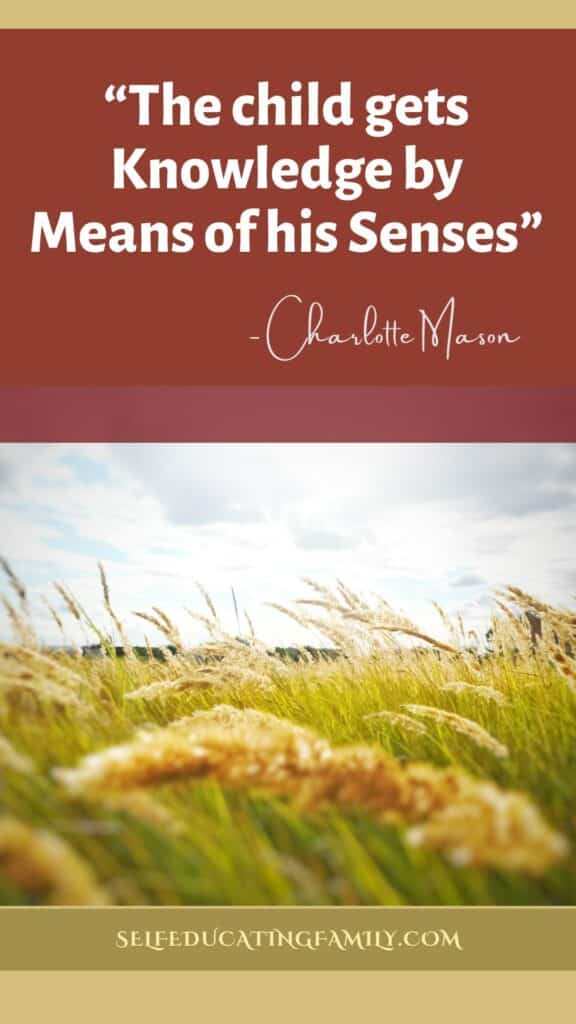

What should the mom be doing?
But she never thinks this is outdoor free-for-all time. Charlotte Mason did say you have to allow time, maybe at teh beginning of being outdoors, for some run-around-and-burn-off-some-energy time. Not in those words, of course. Here are her words:
- “At the same time, here is the mother’s opportunity to train the seeing eye, the hearing ear, and to drop seeds of truth into the open soul of the child, which shall germinate, blossom, and bear fruit, without further help or knowledge of hers.”
- “Who can see the most, and tell the most, about yonder hillock or brook, hedge, or copse. This is an exercise that delights children, and may be endlessly varied, carried on in the spirit of a game, and yet with the exactness and carefulness of a lesson.”
- “The child who has been made to observe how high in the heavens the sun is at noon on a summer’s day, how low at noon on a day in mid-winter, is able to conceive of the great heat of the tropics under a vertical sun, and to understand the climate of a place depends greatly upon the mean height the sun reaches above the horizon.”
Using Observation skills
- “But what is the use of being a ‘very observant child,’ if you are not put in the way of things worth observing?”
- “An observant child should be put in the way of things worth observing.”
- “And not only this: the children should be taught to observe the position of the sun in the heavens from hour to hour, and by his position, to tell the time of day.”
- “There are certain ideas which children must get from within a walking radius of their own home if ever they are to have a real understanding of maps and of geographical terms. Distance is one of these, and the first idea of distance is to be attained by what children find a delightful operation.”
- “The Mother must refrain from too much Talk.”
I love that we, as homeschooling moms, have to learn to talk less while “teaching” or maybe I should say we need to talk less while our kids are “learning”.
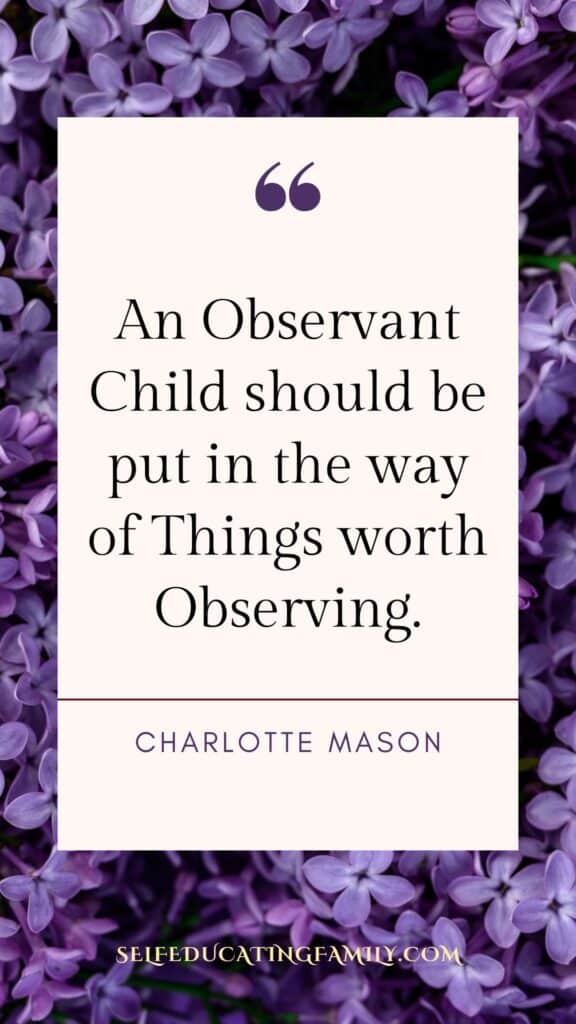
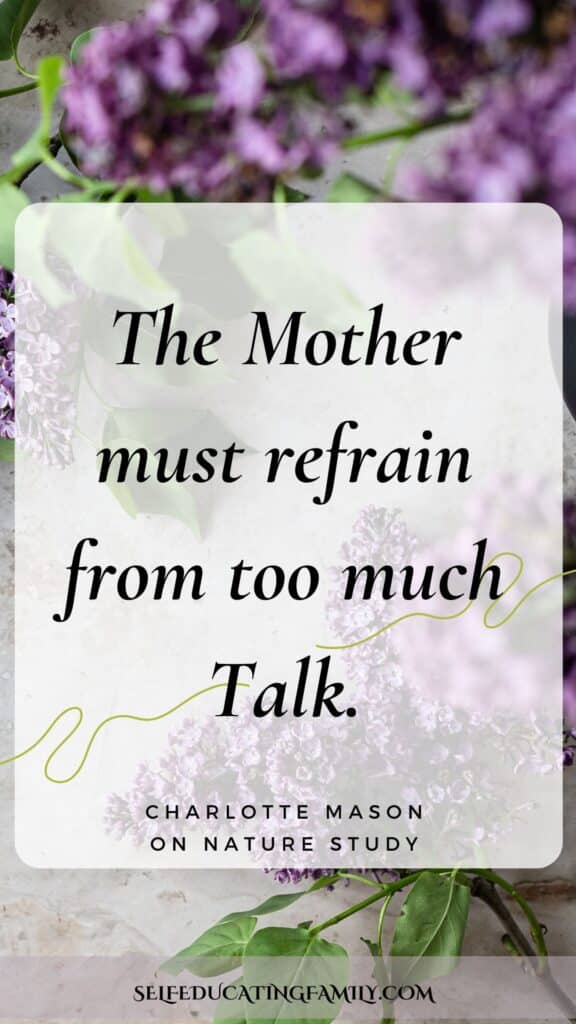
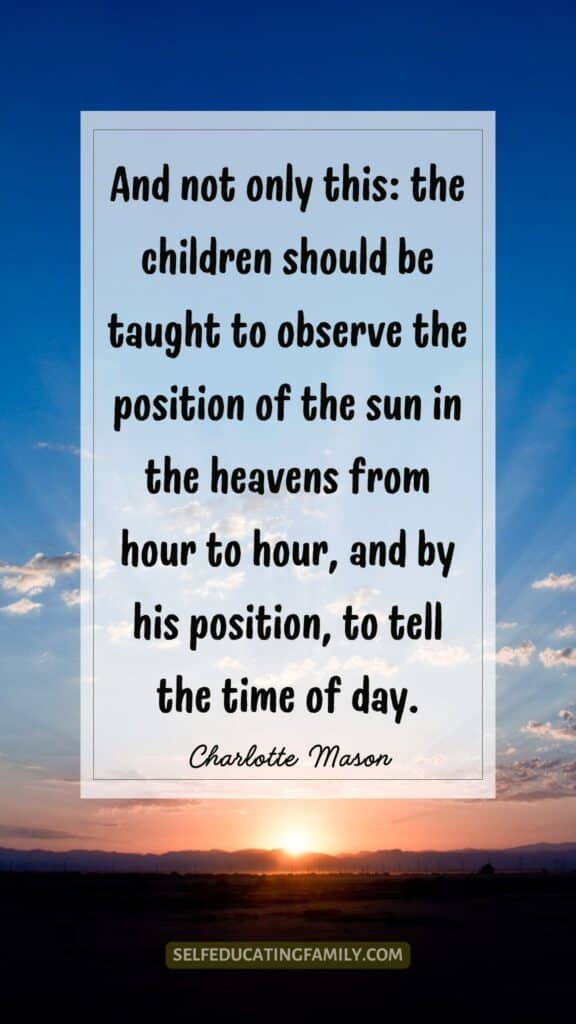
How much time to spend outdoors?
She advocates a LOT of time outdoors.
- “Never be within doors when you can rightly be without.”
- “Winter walks as necessary as summer walks.”
- “Winter walks, too, whether in town or country, give great opportunities for cultivating the habit of attention.”
While she admits this is not easy, she also gives ideas, like eating al fresco, to accomplish the endeavor.

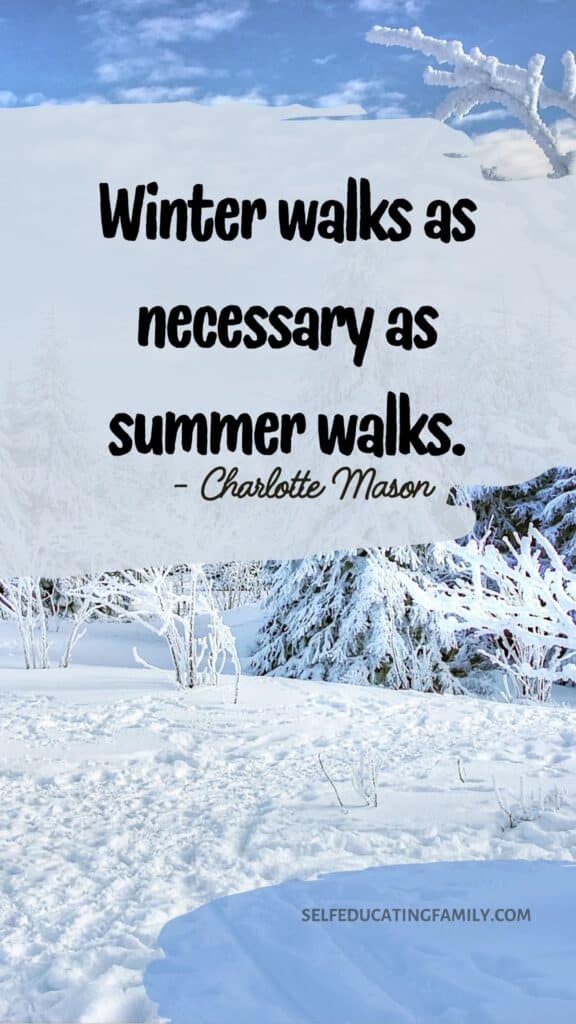
Where can I find the complete works of Charlotte Mason?
If you want to find out more of what she said, Volume 1 is available for free online at the following locations:
- Gutenberg Press | Volume 1
- Ambleside Online | Volume 1 | Modern English Paraphrase version
Or go to Amazon for your own copy of Charlotte Mason’s Volume 1: Home Education. The Modern English Paraphrase version is also available at Amazon because many people find it easier to read.

Keep on Learning
If you would like more ideas for nature journaling, then try my One-Week Challenge: Get Outdoors with Nature Study.
Get the One-Week Video Nature Study Challenge!
In just 5 days, you can jump start your nature studies & using a nature journal with easy habits and routines from this course. Special launch pricing now!
